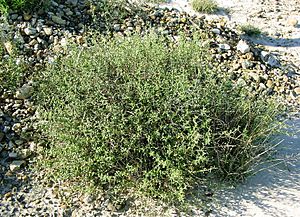Johnston's seaheath facts for kids
Quick facts for kids Johnston's seaheath |
|
|---|---|
 |
|
| Conservation status | |
| Scientific classification | |
| Genus: |
Frankenia
|
| Species: |
johnstonii
|
Frankenia johnstonii is a unique flowering plant. People often call it Johnston's seaheath or Johnston's frankenia. This plant naturally grows in southern Texas in the United States. It also lives in northern Nuevo León, Mexico. There are about 30 known places where this plant can be found.
In 1984, the United States government listed it as an endangered species. This meant it was in danger of disappearing forever. However, by 2003, scientists found many more of these plants. They suggested it might no longer be endangered. Even so, as of 2011, it was still on the endangered list.
Contents
What is Johnston's Seaheath?
This plant is a type of shrub. Shrubs are like small, bushy trees. Frankenia johnstonii grows in open areas. It loves soils that have a lot of salt and gypsum. Gypsum is a soft mineral.
This plant often grows near other plants that also like salty soil. These plants are called halophiles. One example is the saladillo (Varilla texana).
How Does It Look?
For most of the year, Johnston's seaheath looks gray-green or blue-green. But in the fall, it changes color! It turns a bright red. Its stems are thin and wiry. They can grow to be a little over half a meter tall. The whole plant often looks round and bushy.
The leaves are small and grayish or bluish. They are covered in tiny white hairs. This plant can bloom almost any time between September and May. It especially blooms after it rains. Its flowers are white with a yellow center. However, this plant does not make many seeds.
Why Was It Endangered?
In 1984, scientists knew of only six groups of these plants. All of them were on private land. The plants did not look very healthy. They were also reproducing slowly.
Many plants looked like they had been eaten or trimmed by grazing cattle. The cattle also seemed to change the plant's natural home. Fewer than 2,000 plants were counted. This is why it was put on the endangered species list.
Discovery of More Plants
By 2003, many more groups of Frankenia johnstonii were found. This was great news! It showed the plant was more common than first thought. Because of these new discoveries, people suggested taking it off the endangered list.
Threats to Johnston's Seaheath
Even though more plants were found, there are still dangers to its survival. One threat is petroleum exploration. This is when people look for oil and gas in the ground. This can disturb the plant's habitat. Another danger is when people clear away brush. This also destroys the places where the plant lives.
See also
 In Spanish: Flor de cal para niños
In Spanish: Flor de cal para niños


